- Home
- Jon Krakauer
Into the Wild Page 5
Into the Wild Read online
Page 5
Charlie still lives at the same address, in a small teardrop-shaped camping trailer sheathed in rust-pocked tin, without plumbing or electricity, tucked behind the much larger blue-and-white mobile home where McCandless slept. Denuded mountains are visible to the west, towering sternly above the rooftops of adjacent double-wides. A baby-blue Ford Torino rests on blocks in the unkempt yard, weeds sprouting from its engine compartment. The ammonia reek of human urine rises from a nearby oleander hedge.
“Chris? Chris?” Charlie barks, scanning porous memory banks. “Oh yeah, him. Yeah, yeah, I remember him, sure.” Charlie, dressed in a sweatshirt and khaki work pants, is a frail, nervous man with rheumy eyes and a growth of white stubble across his chin. By his recollection McCandless stayed in the trailer about a month.
“Nice guy, yeah, a pretty nice guy,” Charlie reports. “Didn’t like to be around too many people, though. Temperamental. He meant good, but I think he had a lot of complexes—know what I’m saying? Liked to read books by that Alaska guy, Jack London. Never said much. He’d get moody, wouldn’t like to be bothered. Seemed like a kid who was looking for something, looking for something, just didn’t know what it was. I was like that once, but then I realized what I was looking for: Money! Ha! Ha hyah, hooh boy!
“But like I was saying, Alaska—yeah, he talked about going to Alaska. Maybe to find whatever it was he was looking for. Nice guy, seemed like one, anyway. Had a lot of complexes sometimes, though. Had ’em bad. When he left, was around Christmas I think, he gave me fifty bucks and a pack of cigarettes for lettin’ him stay here. Thought that was mighty decent of him.”
In late November, McCandless sent a postcard to Jan Burres in care of a post-office box in Niland, a small town in California’s Imperial Valley. “That card we got in Niland was the first letter from him in a long time that had a return address on it,” Burres remembers. “So I immediately wrote back and said we’d come see him the next weekend in Bullhead, which wasn’t that far from where we were.”
McCandless was thrilled to hear from Jan. “I am so glad to find you both alive and sound,” he exclaimed in a letter dated December 9, 1991.
Thanks so much for the Christmas card. It’s nice to be thought of this time of year…. I’m so excited to hear that you will be coming to see me, you’re welcome any time. It’s really great to think that after almost a year and a half we shall be meeting again.
He closed the letter by drawing a map and giving detailed directions for finding the trailer on Bullhead City’s Baseline Road.
Four days after receiving this letter, however, as Jan and her boyfriend, Bob, were preparing to drive up for the visit, Burres returned to their campsite one evening to find “a big backpack leaning against our van. I recognized it as Alex’s. Our little dog, Sunni, sniffed him out before I did. She’d liked Alex, but I was surprised she remembered him. When the dog found him, she went nuts.” McCandless explained to Burres that he’d grown tired of Bullhead, tired of punching a clock, tired of the “plastic people” he worked with, and decided to get the hell out of town.
Jan and Bob were staying three miles outside of Niland, at a place the locals call the Slabs, an old navy air base that had been abandoned and razed, leaving a grid of empty concrete foundations scattered far and wide across the desert. Come November, as the weather turns cold across the rest of the country, some five thousand snowbirds and drifters and sundry vagabonds congregate in this otherworldly setting to live on the cheap under the sun. The Slabs functions as the seasonal capital of a teeming itinerant society—a tolerant, rubber-tired culture comprising the retired, the exiled, the destitute, the perpetually unemployed. Its constituents are men and women and children of all ages, folks on the dodge from collection agencies, relationships gone sour, the law or the IRS, Ohio winters, the middle-class grind.
When McCandless arrived at the Slabs, a huge flea market-swap meet was in full swing out in the desert. Burres, as one of the vendors, had set up some folding tables displaying cheap, mostly secondhand goods for sale, and McCandless volunteered to oversee her large inventory of used paperback books.
“He helped me a lot,” Burres acknowledges. “He watched the table when I needed to leave, categorized all the books, made a lot of sales. He seemed to get a real kick out of it. Alex was big on the classics: Dickens, H. G. Wells, Mark Twain, Jack London. London was his favorite. He’d try to convince every snowbird who walked by that they should read Call of the Wild.”
McCandless had been infatuated with London since childhood. London’s fervent condemnation of capitalist society, his glorification of the primordial world, his championing of the great unwashed—all of it mirrored McCandless’s passions. Mesmerized by London’s turgid portrayal of life in Alaska and the Yukon, McCandless read and reread The Call of the Wild, White Fang, “To Build a Fire,” “An Odyssey of the North,” “The Wit of Porportuk.” He was so enthralled by these tales, however, that he seemed to forget they were works of fiction, constructions of the imagination that had more to do with London’s romantic sensibilities than with the actualities of life in the subarctic wilderness. McCandless conveniently overlooked the fact that London himself had spent just a single winter in the North and that he’d died by his own hand on his California estate at the age of forty, a fatuous drunk, obese and pathetic, maintaining a sedentary existence that bore scant resemblance to the ideals he espoused in print.
Among the residents of the Niland Slabs was a seventeen-year-old named Tracy, and she fell in love with McCandless during his week-long visit. “She was this sweet little thing,” says Burres, “the daughter of a couple of tramps who parked their rig four vehicles down from us. And poor Tracy developed a hopeless crush on Alex. The whole time he was in Niland, she hung around making goo-goo eyes at him, bugging me to convince him to go on walks with her. Alex was nice to her, but she was too young for him. He couldn’t take her seriously. Probably left her brokenhearted for a whole week at least.”
Even though McCandless rebuffed Tracy’s advances, Burres makes it clear that he was no recluse: “He had a good time when he was around people, a real good time. At the swap meet he’d talk and talk and talk to everybody who came by. He must have met six or seven dozen people in Niland, and he was friendly with every one of them. He needed his solitude at times, but he wasn’t a hermit. He did a lot of socializing. Sometimes I think it was like he was storing up company for the times when he knew nobody would be around.”
McCandless was especially attentive to Burres, flirting and clowning with her at every opportunity. “He liked to tease me and torment me,” she recalls. “I’d go out back to hang clothes on the line behind the trailer, and he’d attach clothespins all over me. He was playful, like a little kid. I had puppies, and he was always putting them under laundry baskets to watch them bounce around and yelp. He’d do it till I’d get mad and have to yell at him to stop. But in truth he was real good with the dogs. They’d follow him around, cry after him, want to sleep with him. Alex just had a way with animals.”
One afternoon while McCandless was tending the book table at the Niland swap meet, somebody left a portable electric organ with Burres to sell on consignment. “Alex took it over and entertained everybody all day playing it,” she says. “He had an amazing voice. He drew quite a crowd. Until then I never knew he was musical.”
McCandless spoke frequently to the denizens of the Slabs about his plans for Alaska. He did calisthenics each morning to get in shape for the rigors of the bush and discussed backcountry survival strategies at length with Bob, a self-styled survivalist.
“Me,” says Burres, “I thought Alex had lost his mind when he told us about his ‘great Alaskan odyssey,’ as he called it. But he was really excited about it. Couldn’t stop talking about the trip.”
Despite prodding from Burres, however, McCandless revealed virtually nothing about his family. “I’d ask him,” Burres says, “‘Have you let your people know what you’re up to? Does your mom know you’re going t
o Alaska? Does your dad know?’ But he’d never answer. He’d just roll his eyes at me, get peeved, tell me to quit trying to mother him. And Bob would say, ‘Leave him alone! He’s a grown man!’ I’d keep at it until he’d change the subject, though—because of what happened between me and my own son. He’s out there somewhere, and I’d want someone to look after him like I tried to look after Alex.”
The Sunday before McCandless left Niland, he was watching an NFL playoff game on the television in Burres’s trailer when she noticed he was rooting especially hard for the Washington Redskins. “So I asked him if he was from the D.C. area,” she says. “And he answered, ‘Yeah, actually I am.’ That’s the only thing he ever let on about his background.”
The following Wednesday, McCandless announced it was time for him to be moving on. He said he needed to go to the post office in Salton City, fifty miles west of Niland, to which he’d asked the manager of the Bullhead McDonald’s to send his final paycheck, general delivery. He accepted Burres’s offer to drive him there, but when she tried to give him a little money for helping out at the swap meet, she recalls, “he acted real offended. I told him, ‘Man, you gotta have money to get along in this world,’ but he wouldn’t take it. Finally I got him to take some Swiss Army knives and a few belt knives; I convinced him they’d come in handy in Alaska and that he could maybe trade them for something down the road.”
After an extended argument Burres also got McCandless to accept some long underwear and other warm clothing she thought he’d need in Alaska. “He eventually took it to shut me up,” she laughs, “but the day after he left, I found most of it in the van. He’d pulled it out of his pack when we weren’t looking and hid it up under the seat. Alex was a great kid, but he could really make me mad sometimes.”
Although Burres was concerned about McCandless, she assumed he’d come through in one piece. “I thought he’d be fine in the end,” she reflects. “He was smart. He’d figured out how to paddle a canoe down to Mexico, how to hop freight trains, how to score a bed at inner-city missions. He figured all of that out on his own, and I felt sure he’d figure out Alaska, too.”
ANZA-BORREGO
No man ever followed his genius till it misled him. Though the result were bodily weakness, yet perhaps no one can say that the consequences were to be regretted, for these were a life in conformity to higher principles. If the day and the night are such that you greet them with joy, and life emits a fragrance like flowers and sweet-scented herbs, is more elastic, more starry, more immortal,—that is your success. All nature is your congratulation, and you have cause momentarily to bless yourself. The greatest gains and values are farthest from being appreciated. We easily come to doubt if they exist. We soon forget them. They are the highest reality…. The true harvest of my daily life is somewhat as intangible and indescribable as the tints of morning or evening. It is a little star-dust caught, a segment of the rainbow which I have clutched.
HENRY DAVID THOREAU,
WALDEN, OR LIFE IN THE WOODS
PASSAGE HIGHLIGHTED IN ONE OF THE BOOKS FOUND
WITH CHRIS MCCANDLESS’S REMAINS
On January 4, 1993, this writer received an unusual letter, penned in a shaky, anachronistic script that suggested an elderly author. “To Whom It May Concern,” the letter began.
I would like to get a copy of the magazine that carried the story of the young man (Alex McCandless) dying in Alaska. I would like to write the one that investigated the incident I drove him from Salton City Calif … in March 1992…to Grand Junction Co…. I left Alex there to hitch-hike to S.D. He said he would keep in touch. The last I heard from him was a letter the first week in April, 1992. On our trip we took pictures, me with the camcorder + Alex with his camera.
If you have a copy of that magazine please send me the cost of that magazine….
I understand he was hurt. If so I would like to know how he was injured, for he always carried enough rice in his backpack + he had arctic clothes + plenty of money.
SINCERELY,
RONALD A. FRANZ
Please do not make these facts available to anybody till I know more about his death for he was not just the common wayfarer. Please believe me.
The magazine that Franz requested was the January 1993 issue of Outside, which featured a cover story about the death of Chris McCandless. His letter had been addressed to the offices of Outside in Chicago; because I had written the McCandless piece, it was forwarded to me.
McCandless made an indelible impression on a number of people during the course of his hegira, most of whom spent only a few days in his company, a week or two at most. Nobody, however, was affected more powerfully by his or her brief contact with the boy than Ronald Franz, who was eighty years old when their paths intersected in January 1992.
After McCandless bid farewell to Jan Burres at the Salton City Post Office, he hiked into the desert and set up camp in a brake of creosote at the edge of Anza-Borrego Desert State Park. Hard to the east is the Salton Sea, a placid ocean in miniature, its surface more than two hundred feet below sea level, created in 1905 by a monumental engineering snafu: Not long after a canal was dug from the Colorado River to irrigate rich farmland in the Imperial Valley, the river breached its banks during a series of major floods, carved a new channel, and began to gush unabated into the Imperial Valley Canal. For more than two years the canal inadvertently diverted virtually all of the river’s prodigious flow into the Salton sink. Water surged across the once-dry floor of the sink, inundating farms and settlements, eventually drowning four hundred square miles of desert and giving birth to a landlocked ocean.
Only fifty miles from the limousines and exclusive tennis clubs and lush green fairways of Palm Springs, the west shore of the Salton Sea had once been the site of intense real estate speculation. Lavish resorts were planned, grand subdivisions platted. But little of the promised development ever came to pass. These days most of the lots remain vacant and are gradually being reclaimed by the desert. Tumbleweeds scuttle down Salton City’s broad, desolate boulevards. Sun-bleached FOR SALE signs line the curbs, and paint peels from uninhabited buildings. A placard in the window of the Salton Sea Realty and Development Company declares CLOSED/CERRADO. Only the rattle of the wind interrupts the spectral quiet.
Away from the lakeshore the land rises gently and then abruptly to form the desiccated, phantasmal badlands of Anza-Borrego. The bajada beneath the badlands is open country cut by steep-walled arroyos. Here, on a low, sun-scorched rise dotted with chollas and indigobushes and twelve-foot ocotillo stems, McCandless slept on the sand under a tarp hung from a creosote branch.
When he needed provisions, he would hitch or walk the four miles into town, where he bought rice and filled his plastic water jug at the market-liquor store-post office, a beige stucco building that serves as the cultural nexus of greater Salton City. One Thursday in mid-January, McCandless was hitching back out to the bajada after filling his jug when an old man, name of Ron Franz, stopped to give him a ride.
“Where’s your camp?” Franz inquired.
“Out past Oh-My-God Hot Springs,” McCandless replied.
“I’ve lived in these parts six years now, and I’ve never heard of any place goes by that name. Show me how to get there.”
They drove for a few minutes down the Borrego-Salton Seaway, and then McCandless told him to turn left into the desert, where a rough 4-x-4 track twisted down a narrow wash. After a mile or so they arrived at a bizarre encampment, where some two hundred people had gathered to spend the winter living out of their vehicles. The community was beyond the fringe, a vision of post-apocalypse America. There were families sheltered in cheap tent trailers, aging hippies in Day-Glo vans, Charles Manson look-alikes sleeping in rusted-out Studebakers that hadn’t turned over since Eisenhower was in the White House. A substantial number of those present were walking around buck naked. At the center of the camp, water from a geothermal well had been piped into a pair of shallow, steaming pools lined with rocks and
shaded by palm trees: Oh-My-God Hot Springs.
McCandless, however, wasn’t living right at the springs; he was camped by himself another half mile out on the bajada. Franz drove Alex the rest of the way, chatted with him there for a while, and then returned to town, where he lived alone, rent free, in return for managing a ramshackle apartment building.
Franz, a devout Christian, had spent most of his adult life in the army, stationed in Shanghai and Okinawa. On New Year’s Eve 1957, while he was overseas, his wife and only child were killed by a drunk driver in an automobile accident. Franz’s son had been due to graduate from medical school the following June. Franz started hitting the whiskey, hard.
Six months later he managed to pull himself together and quit drinking, cold turkey, but he never really got over the loss. To salve his loneliness in the years after the accident, he started unofficially “adopting” indigent Okinawan boys and girls, eventually taking fourteen of them under his wing, paying for the oldest to attend medical school in Philadelphia and another to study medicine in Japan.
When Franz met McCandless, his long-dormant paternal impulses were kindled anew. He couldn’t get the young man out of his mind. The boy had said his name was Alex—he’d declined to give a surname—and that he came from West Virginia. He was polite, friendly, well-groomed.

 Into the Wild
Into the Wild Into Thin Air
Into Thin Air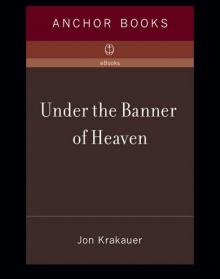 Under the Banner of Heaven: A Story of Violent Faith
Under the Banner of Heaven: A Story of Violent Faith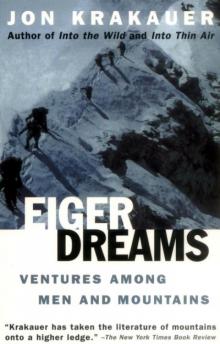 Eiger Dreams: Ventures Among Men and Mountains
Eiger Dreams: Ventures Among Men and Mountains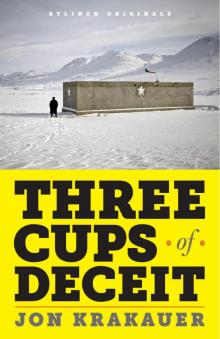 Three Cups of Deceit: How Greg Mortenson, Humanitarian Hero, Lost His Way
Three Cups of Deceit: How Greg Mortenson, Humanitarian Hero, Lost His Way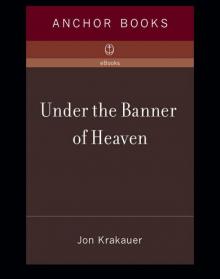 Under the Banner of Heaven
Under the Banner of Heaven Missoula
Missoula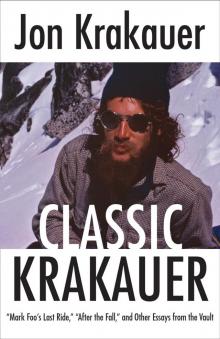 Classic Krakauer
Classic Krakauer